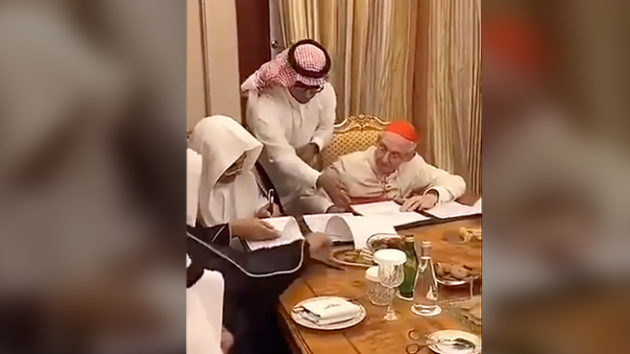Saudis Draw Line in the Sand for Christians
Imagine a country of 830,000 square miles — bigger than Alaska — without a single church. Right now, that’s Saudi Arabia. For Christians, it’s a suffocating place to live. Bibles are illegal, and Muslims knows that if they convert, there’s a very real chance they’ll face the death penalty. The U.S. Commission on International Religious Freedom (USCIRF) has again identified Saudi Arabia as a country of particular concern. So this week’s news — that Saudi Arabia might finally be opening the doors to Christian churches — is a breakthrough of epic proportions.For the first time in history, Vatican officials sat down with Saudi officials and signed an agreement to let churches put down real roots without fear of government retaliation. Cardinal Tauran, who helped pave the way for the deal, told the royal family that Pope Francis has been following the plight of the “hundreds of thousands of Christians in the Saudi kingdom with close attention.” That must have resonated with Saudi Crown Prince Muhammed bin Salman, who’s been genuinely invested in turning Muslims away from the violence of radical Islam.
With his government in turmoil, bin Salman knows this is an opportunity to make a sign of good faith to the West. Maybe he’s making a bid for foreign support for his reforms. Or maybe he’s trying to build a stronger alliance against Iran. Either way, it’s a historic pact.
To understand just how significant this development could be, take the story of one young Saudi mom, who became a Christian years before she met her husband. When her own mother found out about her conversion, she put her under house arrest. Our friends at Open Doors, who’ve been trying to disciple believers in hiding like Nawal, said her mother “kept her inside for years, afraid she’d meet other believers if allowed outside.” She was forced to marry a Muslim man, who even now doesn’t know her secret. According to Saudi law, if he did, he’s “entitled to beat her, divorce her or even kill her. Nobody will come to her rescue.”
So, here Nawal is now. A wife and mother married to a man who cannot find out about her faith. That discovery may cost her life, and her daughter will grow up without a mother. She behaves like a proper Muslim, performing the Muslim prayer rituals five times a day, at least when other people are around. But in her heart, she is still praying to Jesus and asking Him to give her the strength to keep believing, even though she’s completely isolated.
But the reality is that fear, depression, and the feeling of being isolated are continuously threatening Nawal’s faith. On her wedding day, she grew so afraid of being exposed as a believer that she felt she had to say goodbye to the believers who were still in touch with her through social media. Her last message to them: ‘I will delete your contact information, and I may not respond anymore for my own safety. But please know that I will read whatever you send me.’
Who knows how many Nawals are in Saudi Arabia, desperately wishing for the freedom to worship that we take for granted? Not surprisingly, activists like Nina Shea, who’ve worked their whole lives to fight the spread of these dangerous ideologies, are skeptical about such a sweeping reform coming to fruition. But, as even she’s pointed out, it could be that President Trump’s tough rhetoric on terrorism and Islamic extremism is finally paying off. Other Europeans are starting to speak up too, demanding that King Bin Salman bin Abdulaziz Al Saud lift its ban on all “non-Muslim religious activities.”
Under Obama, she explains, the State Department gave the Saudis a pass for years. “It deflected criticism of the Saudi Kingdom and reassured the public in its annual religious freedom reports that Saudi Arabia has ‘reformed’ and ‘improved… My investigations show that it hadn’t. Even after a 2014 New York Times report that Saudi texts were being used by ISIS in schools in its then-stronghold of Mosul, Iraq, the State Department concealed [it]…” Now, she says, cautiously optimistic, “the West finally seems to be waking up.”
A lot of that credit belongs to the Trump administration, who, together with Secretary Mike Pompeo and Ambassador Sam Brownback, are once again making religious freedom a foreign policy priority — bringing hope and help to the persecuted around the world.
Tony Perkins’ Washington Update is written with the aid of FRC senior writers.
RELATED ARTICLES:
Amazon a Prime Suspect in Charity War
Threats to Apostates “Most Severe” in Muslim Countries and Beyond
RELATED PODCAST: The World Wide Persecution of Christians.



Saudi Arabia has for years forbid Christians bibles, churches. Have had to be secretive about being a Christian. Could have their life taken from them.I wouldn’t trust the possibility of anything positive coming from them.